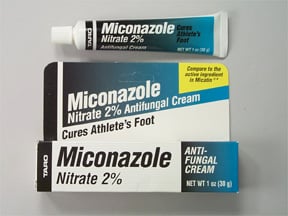
Antifungal Coupons & Savings Card – Discount Prices from $5.27
Brand for: Miconazole nitrate
Miconazole is used to treat skin infections such as athlete's foot, jock itch, ringworm, and other fungal skin infections (candidiasis). This medication is also used to treat a skin condition known as pityriasis (tinea versicolor), a fungal infection that causes a lightening or darkening of the skin of the neck, chest, arms, or legs. Miconazole is an azole antifungal that works by preventing the growth of fungus.
Our Antifungal coupons are free to use. You can print the coupon, email it to yourself, or receive the Antifungal coupon via text message. To get your free discount, show the pharmacist your Antifungal savings card which has the discounted coupon price. Use our filters below to edit the prescription box to match your needs. The Antifungal prices will update based on your prescription needs. Above our Antifungal coupons, you can change the location to see pharmacy prices in other areas. Our prescription discount card will update online with the specific pharmacy costs associated with your edits. Be sure to text, email, or print the Antifungal savings card code that you need after editing the prescription box and location field. Show the discount card to your pharmacist before paying.
My prescription
Edit
14GM of 2%, Miconazole Nitrate (1 Tube)
Select pharmacy

Walgreens
$5.27
COUPON PRICE
Albertsons
$5.27
COUPON PRICEAntifungal savings card
Show this card to your pharmacist
Walgreens
$5.27
BIN
ID
PCN
GRP
011867
LH3403DE3B
HT
LABH001
Powered by
Miconazole is used to treat skin infections such as athlete's foot, jock itch, ringworm, and other fungal skin infections (candidiasis). This medication is also used to treat a skin condition known as pityriasis (tinea versicolor), a fungal infection that causes a lightening or darkening of the skin of the neck, chest, arms, or legs. Miconazole is an azole antifungal that works by preventing the growth of fungus.
Our Antifungal coupons are free to use. You can print the coupon, email it to yourself, or receive the Antifungal coupon via text message. To get your free discount, show the pharmacist your Antifungal savings card which has the discounted coupon price. Use our filters below to edit the prescription box to match your needs. The Antifungal prices will update based on your prescription needs. Above our Antifungal coupons, you can change the location to see pharmacy prices in other areas. Our prescription discount card will update online with the specific pharmacy costs associated with your edits. Be sure to text, email, or print the Antifungal savings card code that you need after editing the prescription box and location field. Show the discount card to your pharmacist before paying.
Our Antifungal coupons are free to use. You can print the coupon, email it to yourself, or receive the Antifungal coupon via text message. To get your free discount, show the pharmacist your Antifungal savings card which has the discounted coupon price. Use our filters below to edit the prescription box to match your needs. The Antifungal prices will update based on your prescription needs. Above our Antifungal coupons, you can change the location to see pharmacy prices in other areas. Our prescription discount card will update online with the specific pharmacy costs associated with your edits. Be sure to text, email, or print the Antifungal savings card code that you need after editing the prescription box and location field. Show the discount card to your pharmacist before paying.
Antifungal FAQs
Using the SaveHealth discount card, what is the price of Antifungal without insurance?
Using the SaveHealth discount card, the price of Antifungal without insurance is $5.27.
What is the price of Antifungal at Walgreens?
The price of Antifungal at Walgreens is $5.27.
